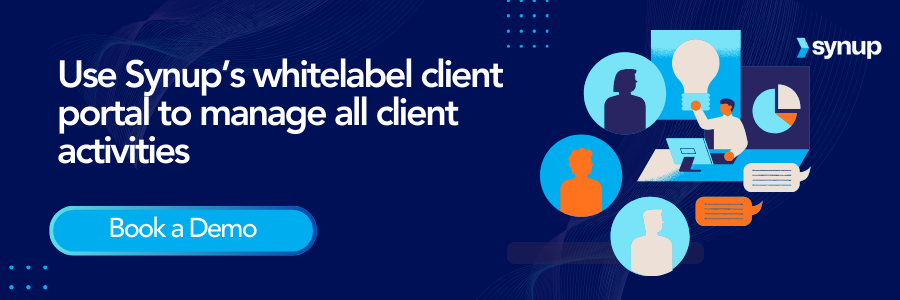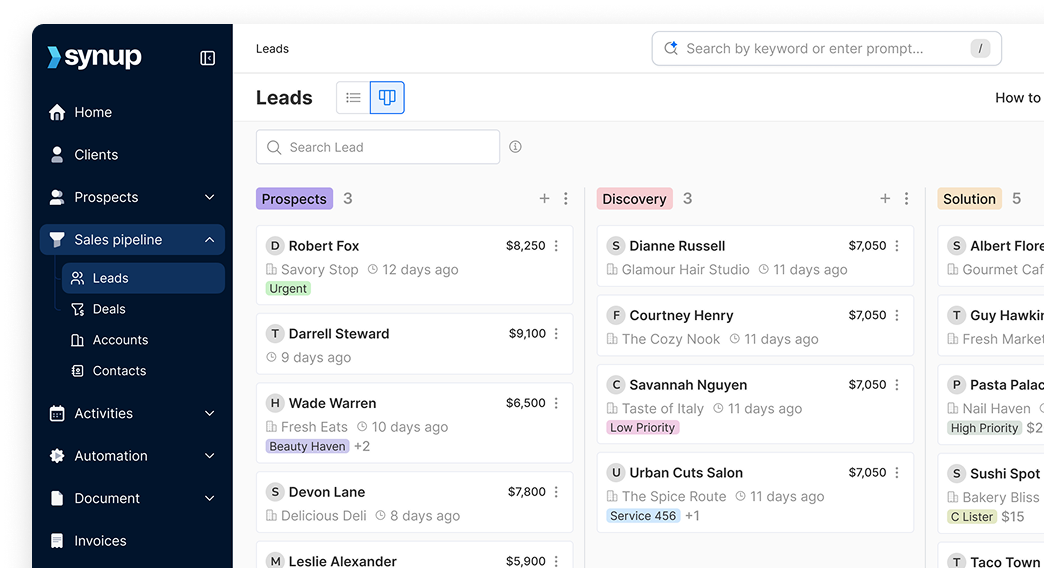White Label für Agenturen: Was im Jahr 2024 zu beachten ist + Checkliste für den Anfang
Sie möchten mit einem White-Label-Lösungsanbieter zusammenarbeiten, wissen aber nicht, wo Sie anfangen sollen? Machen Sie sich keine Sorgen, hier finden Sie eine ausführliche Anleitung und eine Checkliste, die Ihnen helfen werden, auf den richtigen Weg zu kommen.
Als Agenturinhaber haben Sie wahrscheinlich die Auswirkungen gespürt, wenn Sie keine White-Label-Lösungen anbieten. Dies kann dazu führen, dass Kunden nach anderen Agenturen suchen, die ein breiteres Leistungsspektrum anbieten, was Ihr Wachstum hemmt und es schwieriger macht, den sich ändernden Kundenanforderungen gerecht zu werden. Kurz gesagt, es kann Sie mehr als nur Chancen kosten: Es kann Sie Ihre Kunden kosten.
Die Zusammenarbeit mit einer White-Label-Lösung kann Ihnen jedoch helfen, all diese Herausforderungen zu meistern!
Sobald Sie dies verstanden haben, können Sie Ihr Serviceangebot erweitern, ohne dass eine interne Entwicklung erforderlich ist (zu viel niedrigeren Kosten!)
In diesem Artikel gehen wir auf drei wichtige Punkte ein:
- Was White Labeling ist und warum es 2024 wegweisend ist.
- So wählen Sie einen White-Label-Anbieter aus, der Ihren Anforderungen entspricht
- Eine praktische Checkliste, um sicherzustellen, dass Sie alle Grundlagen abdecken.

Was ist White Labeling für Agenturen?
White-Label-Services sind eine ausgeklügelte Geschäftsstrategie, bei der ein Anbieter Produkte oder Dienstleistungen an eine Agentur oder einen Wiederverkäufer liefert, der sie dann umbenennt und als seine eigenen verkauft. Dieser Ansatz ermöglicht es Unternehmen, externes Fachwissen und Ressourcen zu nutzen, ohne alles intern entwickeln zu müssen.
Sie finden White-Label-Dienstleistungen in verschiedenen Branchen, vom Marketing bis zur Softwareentwicklung. Sie ermöglichen es Wiederverkäufern, ihr Angebot zu erweitern, ohne sich mit tiefgreifenden Entwicklungs- oder Produktionsproblemen auseinandersetzen zu müssen.
Alles in allem ist White Labeling eine flexible Strategie, mit der Sie Ihr Agenturgeschäft skalieren und auf ein ganz neues Niveau heben können.
Bedeutung von White Labeling für Agenturen im Jahr 2024
Hier sind einige *wirklich* wichtige Gründe, warum White Labeling der richtige Weg ist, besonders im Jahr 2024! ⭐️
- Es hilft Ihnen, Ihre Dienstleistungen unter Ihrer Marke zu erweitern, ohne hohe Investitionen in Infrastruktur oder Technologie tätigen zu müssen. Damit Sie sich keine Sorgen machen müssen, ein Vermögen für interne Investitionen auszugeben, sondern es stattdessen auslagern zu lassen.
- Sie können ganz einfach qualitativ hochwertige Dienstleistungen anbieten, die dazu beitragen, die Glaubwürdigkeit und das Vertrauen Ihrer Kunden aufzubauen — und niemand versteht das besser als Agenturen!
- Sparen Sie Kosten im Vergleich zur Entwicklung interner Lösungen. So können Sie sich auf Kernaktivitäten konzentrieren, die für Sie viel wichtiger sind. Auf diese Weise können Sie auch einen Teil Ihrer internen Ausgaben reduzieren, sodass Sie Zeit, Raum, Flexibilität und geistigen Freiraum haben, um Dinge zu entwickeln, für die Sie sich wirklich begeistern.
- Wir verstehen es - es ist schwierig. Eine Agentur aufzubauen und zu skalieren ist keine leichte Aufgabe! Umso mehr benötigen Sie eine White-Label-Lösung, mit der Sie mit den sich ständig ändernden Markttrends Schritt halten können.
- Sie können problemlos mehr Kunden aufnehmen, mehr Arbeit delegieren und müssen sich keine Gedanken über Bandbreitenprobleme machen. Es ist einfach und funktioniert genauso, als würde man ein Projekt an einen Freelancer auslagern.
- Konzentrieren Sie sich nicht auf langweilige Aufgaben, sondern auf Aufgaben, die strategisches Engagement erfordern, und bauen Sie zwischenmenschliche Beziehungen zu Kunden auf, um sie besser kennenzulernen.
Auf welche Dinge sollten Sie achten?
Fangen wir zuerst mit dem Wichtigsten an. Auf welche Dinge müssen Sie achten, wenn Sie sich für eine White-Label-Lösung als Partner entscheiden?
- Konsistente Markenbotschaft
Als Agentur müssen Sie verstehen, wie wichtig das Branding auf verschiedenen Kanälen und Plattformen ist. Das Gleiche gilt, wenn Sie nach einem White-Label-Partner suchen. Die Markenidentität Ihrer Agentur muss auch unter Verwendung externer Quellen kohärent bleiben. Um dies zu erreichen, können Sie sicherstellen, dass der Anbieter von White-Label-Lösungen auf die Stimme, die Werte und das Image Ihrer Marke abgestimmt ist, um Ihre Kunden nicht zu verwirren und Ihnen bei der Wiedererkennung Ihrer Marke zu helfen.
- Ergänzt die Stärken Ihrer Agentur
White-Label-Lösungen sollten Ihre vorhandenen Stärken ergänzen, anstatt sie zu duplizieren. Wenn sich Ihre Agentur beispielsweise durch digitale Strategien auszeichnet, es aber an interner Entwicklung mangelt, kann die Partnerschaft mit einem White-Label-Anbieter für technische Lösungen die Lücke schließen, ohne Ihre Kernkompetenz zu verwässern. Gleichzeitig hilft es Ihnen auch dabei, ein zusätzliches Paar Hände zu bekommen, denen Sie vertrauen können.
- Anpassungsoptionen zur Wahrung der Markenintegrität
Suchen Sie nach White-Label-Anbietern, die Anpassungsoptionen anbieten. Auf diese Weise können Sie den Service an den Stil Ihrer Marke anpassen und sicherstellen, dass er gut zu Ihren bestehenden Angeboten passt. Diese Funktionen können variieren, z. B. markenspezifische Dashboards, personalisierte Berichte und maßgeschneiderte Serviceelemente.
Die Bedürfnisse Ihrer Kunden verstehen
- Suchen Sie nach einer Lösung, die den Anforderungen Ihres Kunden entspricht
Es ist wichtig sicherzustellen, dass Sie verstehen, was Ihre Kunden benötigen, bevor Sie White Labeling als Dienstleistung anbieten. Sie können verschiedene Umfragen und Interviews durchführen und Fragebögen vorbereiten, damit sie ihre Anforderungen besser verstehen. Es ist auch wichtig, ihre Schwachstellen zu verstehen und zu verstehen, wonach sie suchen, was ihnen fehlt und so weiter. Dies hilft Ihnen bei der Auswahl der richtigen White-Label-Lösung für sie.
- Entscheiden Sie sich nicht für den „Einheitsansatz“
Nicht alle White-Label-Services werden den Bedürfnissen aller Kunden gerecht. Wenn Ihre Kunden beispielsweise nach fortschrittlichen Datenanalysefunktionen fragen, stellen Sie sicher, dass der White-Label-Anbieter die Analysetools anbietet, mit denen Sie die Erkenntnisse gewinnen können, die Ihre Kunden benötigen. Wenn Sie den Service an den Kundenerwartungen ausrichten, können Sie Ihren Kunden die Erlebnisse bieten, nach denen sie tatsächlich suchen.
- Sorgen Sie für größtmögliche Transparenz gegenüber Ihren Kunden
Wenn Sie bei der Nutzung von White-Label-Diensten transparent sind, bauen Sie nicht nur Vertrauen bei Ihren Kunden auf, sondern geben ihnen auch das Gefühl, dass Sie auf sie aufpassen. Informieren Sie sie also über die White-Label-Dienste und darüber, wie sie davon profitieren werden. Dies wird dazu beitragen, die Kundenerwartungen zu erfüllen und eine engere Beziehung zwischen Kunde und Agentur zu fördern.
Suchen Sie nach skalierbaren und flexiblen Optionen
- Bietet skalierbare Lösungen
Stellen Sie immer sicher, dass der White-Label-Lösungsanbieter, mit dem Sie zusammenarbeiten, Ihre Agentur an das Wachstum anpassen kann. Es sollte über genügend Kapazität verfügen, um mehr Kunden zu bedienen, ohne Ihre Leistung zu beeinträchtigen.
- Modular oder All-in-One?
Entscheiden Sie, ob modulare oder All-in-One-Lösungen den Bedürfnissen Ihrer Agentur am besten entsprechen. Modulare Optionen ermöglichen es Ihnen, bestimmte Dienste auf Abruf anzubieten, während All-in-One-Lösungen ein umfassendes Paket bieten. Sie können wählen, je nachdem, wie gut die Lösung zur aktuellen Struktur und den Plänen Ihrer Agentur passt.
- Kann sich leicht anpassen
Wählen Sie einen White-Label-Anbieter, der sich problemlos an die sich ständig ändernden Markttrends und die Bedürfnisse Ihrer Kunden anpassen kann. Je einfacher es für Sie ist, umzusteigen und neue Funktionen oder Dienste anzubieten, desto einfacher wird es für Sie sein, auf dem Markt relevant zu bleiben.
Technologie und Integrationen
- Lässt sich in Ihren aktuellen Tech Stack integrieren
Haben Sie einen Tech-Stack, auf den Sie sich verlassen? Als Agentur tun wir das alle. Daher müssen Sie bei der Auswahl Ihres White-Label-Anbieters sicherstellen, dass sich Ihr Tech-Stack problemlos und ohne Hindernisse oder Unstimmigkeiten in dessen Plattform integrieren lässt. Dazu müssen Sie möglicherweise prüfen, ob sie mit Ihrem CRM, Ihren Analysetools und anderen Softwaresystemen, die Sie täglich verwenden, kompatibel sind.
- API-Funktionen und Benutzerfreundlichkeit
Suchen Sie nach Anbietern, die API-Funktionen und benutzerfreundliche Plattformen anbieten. Die API-Kompatibilität ermöglicht einen reibungslosen Datenaustausch und eine Automatisierung, während eine intuitive Plattform die Benutzerfreundlichkeit für Ihr Team und Ihre Kunden gewährleistet.
- Automatisierungsfunktionen
Der White-Label-Service sollte Automatisierungsfunktionen unterstützen, die auf den Arbeitsablauf Ihrer Agentur abgestimmt sind. Dies kann automatisierte Berichterstattung, Kundenbenachrichtigungen und Aufgabenverwaltung umfassen. Eine ordnungsgemäße Automatisierung reduziert den manuellen Aufwand und erhöht die betriebliche Effizienz.
Support und Schulung
- Kundensupport
Das Maß an Unterstützung, das potenzielle White-Label-Anbieter bieten, spielt eine wichtige Rolle bei der Überlegung, ob sie sich für ihre Plattform anmelden sollen oder nicht. Zuverlässiger, reaktionsschneller Support ist entscheidend, um Probleme schnell zu lösen und die Servicequalität aufrechtzuerhalten. Stellen Sie sicher, dass der Anbieter mehrere Supportkanäle anbietet und für seinen exzellenten Kundenservice bekannt ist. Sie können sich dazu auch einige Produktbewertungsplattformen oder Bewertungen von Google, Reddit und Twitter ansehen.
- Trainingsmodule
Bieten sie genügend Schulungen an, um Ihnen zu helfen, ihre Plattform im Detail zu verstehen? Schulungen durch den White-Label-Anbieter können Ihrem Team helfen, sich schnell auf den neuesten Stand zu bringen. Suchen Sie nach Anbietern, die detaillierte Einführungen, Schulungen und Ressourcen anbieten, um sicherzustellen, dass Ihr Team gut auf die Verwaltung und Bereitstellung der White-Label-Services vorbereitet ist.
- Zusätzliche Ressourcen
Der Zugriff auf Marketingmaterial, häufig gestellte Fragen und Tools zum Kunden-Onboarding durch den Anbieter kann Ihre Bemühungen zur Förderung und Integration von White-Label-Services unterstützen. Diese Ressourcen helfen dabei, die Kundeninteraktionen zu optimieren und die Fähigkeit Ihrer Agentur zu verbessern, Mehrwert zu bieten.
Rechtliche und vertragliche Auswirkungen
- Grundlegende Gesetzmäßigkeiten
Machen Sie sich mit den rechtlichen Aspekten von White Labeling vertraut, einschließlich geistiger Eigentumsrechte, Serviceverträge und Haftungsfragen. Stellen Sie sicher, dass alle rechtlichen Aspekte klar sind und dass die Bedingungen die Interessen Ihrer Behörde schützen.
- Übereinkünfte
Verhandeln Sie NDAs und Serviceverträge, in denen die Verantwortlichkeiten und Erwartungen beider Parteien klar umrissen sind. Schützen Sie geistige Eigentumsrechte, um Missbrauch oder unbefugte Verbreitung Ihrer geschützten Informationen zu verhindern.
- Verbindlichkeiten und Kündigung
Prüfen Sie sorgfältig die Kündigungsklauseln, Exklusivitätsvereinbarungen und Haftungsbedingungen in Ihren Verträgen. Stellen Sie sicher, dass Sie die Bedingungen verstehen, unter denen Verträge gekündigt werden können, und alle Verbindlichkeiten, die Sie möglicherweise nach Abschluss oder Beendigung der Dienste bezahlen müssen.
Zum Schluss ist hier Ihre All-in-One-Checkliste
✅ Surfen Sie zunächst online und vernetzen Sie sich, um White-Label-Lösungsanbieter zu finden, die Ihren Anforderungen entsprechen. Nehmen Sie sich Zeit für die Recherche und nehmen Sie einige vielversprechende in die engere Wahl. Konzentrieren Sie sich dabei auf diejenigen mit einer soliden Erfolgsbilanz, vielfältiger Projekterfahrung und einem anständigen Kundenstamm. Mehr Erfahrung in verschiedenen Branchen bedeutet in der Regel bessere Ergebnisse für Sie.
✅ Sehen Sie sich ihr Portfolio an, um zu sehen, welche Art von Projekten sie durchgeführt haben und wie sich ihre Preise je nach Komplexität ändern. Und hören Sie nicht nur bei Google-Bewertungen auf — schauen Sie sich Plattformen wie G2, TrustRadius, Capterra oder sogar Reddit an, um sich ein umfassenderes Bild zu machen. Je mehr Bewertungen, desto besser. Informieren Sie sich über ihre Vor- und Nachteile und versuchen Sie, mehr über ihre Dienste besser zu erfahren.
✅ Preise vergleichen. Einige bieten möglicherweise Dienste auf Abonnementbasis an, während andere stundenweise abrechnen. Oft sind die Preise verhandelbar, also zögern Sie nicht, dieses Gespräch zu führen. Sobald Sie die Hausaufgaben gemacht haben, schließen Sie ein Geschäft ab, das auf gegenseitigem Verständnis basiert.
✅ Auch wenn Sie keinen technischen Hintergrund haben, stellen Sie sicher, dass Sie detaillierte Fragen zum Entwicklungsprozess, zur Teamkoordination, zu Kommunikationsfenstern, Qualitätsprüfungen, versteckten Kosten und Lieferzeiten stellen. Wenn ihre Antworten vage oder abschreckend sind, ist es wahrscheinlich am besten, weiterzumachen.
✅ Machen Sie sich klar, was Sie erwarten. Fragen Sie, ob sie einen engagierten Entwickler oder Projektmanager beauftragen, Sie auf dem Laufenden zu halten. Das Ziel ist eine transparente und unkomplizierte Kommunikation von Anfang an.
✅ Sobald Sie einen White-Label-Anbieter in die engere Wahl gezogen haben, geben Sie ihm ein Testprojekt. Dies zeigt Ihnen, wie sie arbeiten, wie sie Termine einhalten und wie sie mit der Kommunikation umgehen. Wenn sie Projektmanagement-Software verwenden, fordern Sie an, hinzugefügt zu werden, damit Sie den Fortschritt verfolgen können, ohne ständig nachschauen zu müssen. Das Setzen von Meilensteinen in der Software kann auch dazu beitragen, dass die Dinge in Bewegung bleiben.
✅ Beim White-Labeling ist es wichtig, die Gesetzmäßigkeiten zu regeln. Sorgen Sie für klare Serviceverträge, schützen Sie Ihr geistiges Eigentum und stellen Sie sicher, dass NDAs eingehalten werden. Prüfen Sie die Kündigungsklauseln, Exklusivitätsbestimmungen und Haftungsbedingungen, um sicherzustellen, dass die Interessen Ihrer Behörde in vollem Umfang gewahrt werden.
✅ Achten Sie abschließend auf die Arbeitskultur des Unternehmens. Es ist wichtig, wie sie mit ihrem Team und ihren Kunden kommunizieren. Stellen Sie im Voraus Fragen, z. B. zu ihren Erfahrungen mit Kunden, um spätere Überraschungen zu vermeiden.
✅ Telearbeit ist heute die Norm. Auch wenn Sie das Team nie persönlich treffen, stellen Sie sicher, dass es kommunikativ und professionell ist und halten Sie sich an die Termine. Wenn sich etwas nicht gut anfühlt, zögern Sie nicht, andere Optionen zu erkunden.
Fazit
Wir hoffen, dieser Leitfaden gibt Ihnen die Klarheit, die Sie benötigen, um einen White-Label-Anbieter auszuwählen, der Ihnen nicht nur bei der Skalierung hilft, sondern auch problemlos zu Ihrem Budget passt. Der richtige Partner kann einen großen Unterschied machen, wenn es darum geht, Ihr Serviceangebot zu erweitern und Ihre Kunden zufrieden zu stellen.
Und wenn Sie eine Agentur sind, die mit einer zuverlässigen White-Label-Lösung den nächsten Schritt machen möchte, schauen Sie sich unbedingt an Synup. Es wurde entwickelt, um Agenturen wie Ihrer dabei zu helfen, Dienstleistungen zu optimieren, die Kundenzufriedenheit zu steigern und zu wachsen, ohne die schwere Arbeit der internen Entwicklung. Die All-in-One-Plattform von Synup könnte genau das sein, was Sie benötigen, um Ihre Geschäftsabläufe zu vereinfachen und auf die nächste Stufe zu heben, damit Sie sich auf die wichtigen Dinge konzentrieren können. ✨

White Label für Agenturen: Was im Jahr 2024 zu beachten ist + Checkliste für den Anfang — Häufig gestellte Fragen
- Wie gründe ich eine White-Label-Agentur?
Um eine White-Label-Agentur zu gründen, identifizieren Sie die Dienstleistungen, die Sie anbieten möchten, finden Sie einen zuverlässigen White-Label-Anbieter und benennen Sie dessen Lösungen in Ihre eigenen um. Konzentrieren Sie sich darauf, die Dienstleistungen auf Ihren Zielmarkt abzustimmen und eine nahtlose Integration in die Angebote Ihrer Agentur sicherzustellen.
- Was ist White-Label-Content für Agenturen?
White-Label-Inhalte für Agenturen beziehen sich auf vorgefertigte Inhalte — wie Blogs, Beiträge in sozialen Netzwerken oder Videos —, die von einem Drittanbieter produziert wurden und die Agenturen als ihre eigenen umbenennen und weiterverkaufen können. Auf diese Weise können Agenturen ihren Kunden Inhaltsdienste anbieten, ohne diese intern erstellen zu müssen.
- Was ist für White Labeling erforderlich?
White Labeling erfordert einige wichtige Komponenten:
- Ein zuverlässiger Drittanbieter, der das Produkt oder die Dienstleistung liefert.
- Funktionen zur Umbenennung, sodass das Angebot der Identität Ihrer Agentur entspricht.
- Klare rechtliche Vereinbarungen wie Vertraulichkeitsvereinbarungen und Serviceverträge zum Schutz geistigen Eigentums und zur Sicherstellung der Rechenschaftspflicht.
- Nahtlose Integration in Ihr bestehendes Geschäftsmodell für ein reibungsloses Kundenerlebnis.
Viel Spaß beim White-Labeling! ✨




